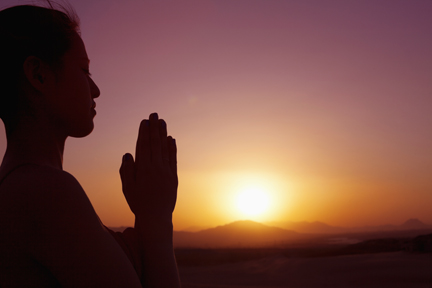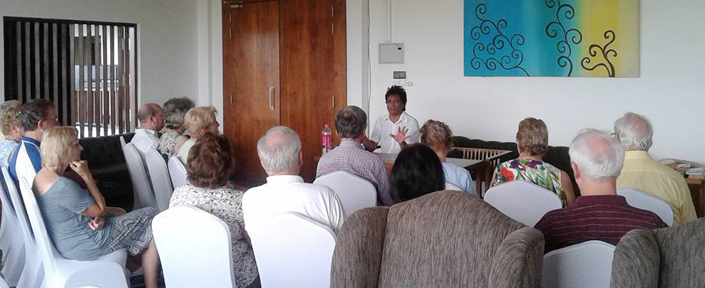International scenario should be studied first
Promoting spiritual tourism:
Sri Lanka has immense potential to be developed as a destination for
spiritual tourism by grabbing a share of the 40 million people who
travel out of their homes seeking spiritual uplift each year, says
former Sri Lanka Convention Bureau CEO Vipula Wanigasekera in an
interview with Sunday Observer Business.
Excerpts
 Q - What is spiritual tourism? Q - What is spiritual tourism?
A - This is often mistaken for pilgrim tourism. Pilgrim
tourism fulfills the need of a traveller or a devotee to see, witness
and worship places of religious significance. Travellers to Buddhagaya,
Jerusalem, Putrapathi and Mecca fall into this category. Pilgrim tourism
calls for the development of such locations and marketing them in the
target market.
Spiritual tourism on the other hand, is where travellers visit places
and meet people to find inner peace. One may call them spiritual seekers
or finders of the true nature of life.
Q - What is the current scenario in spiritual tourism from the
point of view of international tourism?
A - The last two UNWTO conferences in Vietnam and Spain
established that nearly 40 million people travel out of their homes
seeking spiritual revival per year and the numbers keep increasing.
This includes yoga, meditation and taking part in religious
discourses and discussions. The reason is obvious. The modern world is
producing more stressful and anxious people than successful people with
a high level of profit motives. Never before was there high employee
turnover and breakaway groups. This is inevitable.
Many find spiritual teachings to be a way of escaping from the
fast-paced world and this has resulted in the increase of numbers in
spiritual tourism.
Q - Is there any way we could promote spiritual tourism? After
all we need a small percentage of the 40 million and among them could
well be high spenders.
A - Of course. How much is inner peace worth? People will pay
any price provided they get what they are looking for. Sri Lanka could
not understand this market because our country engages in heavy
ritualistic practices where for instance results are expected in the
next life.
The core message of the Buddha is generally submerged by these
rituals. I am not referring to traditions. Traditions are vital to
preserve Buddhist culture but ritualistic practices have ridiculed
Buddhist philosophy with which the followers are expected go back home.
Therefore, tourists cannot find a correlation between what is done and
the results.
Q - What do you suggest to promote spiritual tourism?
A - First, understanding what the travellers are looking for.
Whatever they engage in, should be experiential. Anything that leads to
a ritual or a belief, would make them run a mile. Inner peace would also
mean absence of stress, anxiety, worries, restlessness and anger. This
calls for finding the root causes for these.
Second, study what is happening in the international spiritual arena.
After the Second World War, people embraced their religions closely and
in the decades that followed, moved to learning the philosophies spelt
out by others without leaving their original faith. This is what is
happening even now. Modern spirituality is non-controversial as it does
not clash with religions. What happens is that one is given the
opportunity of analysing one's own experience and the facilitator's task
is to get the participants to look at life from a different perspective.
It could be through meditation, guided meditation or continuous
discourses with retreats.
 Q - You embarked on a meditation program for tourists. How
successful was it? Q - You embarked on a meditation program for tourists. How
successful was it?
A - I had no intention of doing so at the beginning. I only
had an idea of launching a book with my thoughts which I collected over
several years of research. The research covered Buddhist practices in
Sri Lanka to spirituality with an international outlook.
After launching the book, Pointers to Enlightenment with the help of
many friends in the travel industry and outside, I was invited by the
Siddhalepa Group to conduct sessions during week-ends and there was no
looking back since then.
However, this needs to be taken to another level by offering
spiritual packages. Travel companies must work on it having understood
what has to be offered, where and how. Many organisations have contacted
me and they are either speaking of pilgrim tourism or some kind of a
rigorous meditative training, both of which are not accepted by
spiritual seekers. This is why the international scenario needs to be
studied first.
For instance, when Anthony Mooyang ( Mooji) conducts discourses and
meditation in Monte Sahaja, hundreds of groups come, sometimes to listen
to him only for one hour while others may stay for a couple of days.
Monte Sahaja was not a place known for spirituality nor does Mooji
represent any religion while he recognises and acknowledges the work of
Jesus Christ and the Buddha.
People will travel from Canada to listen to Jeff Foster in London.
Ekhart Tolle spoke to Google staff virtually stunning them with his
version of how creativity arises. Followers go wherever Jeff Foster is
due to speak.
Today, people are inclined to know why the Buddha said, "Peace cannot
come from outside" or why Jesus Christ said, "Lose yourself to find
yourself". Their quotes such as "you are the world" and "you are the
light of the world" are now interpreted through practical experiences.
Q - How do you conduct your sessions and what is your message?
A - It is a one-hour discourse and guided meditation. I am
currently doing this with tourists and it might take a while for Sri
Lankans to grasp it as such a discourse can be embraced only if one
attends it with an open mind.
It reveals the fallacious ideas of human life, life story and the
unrealistic goals they go after. This is different to the masters of
motivation and leadership who believe one could create 100 percent
motivation or turn everyone into leaders. But that is how the commercial
world moves on.
We have lived with these fallacies for centuries and now the world is
turning towards modern spirituality which certainly helps people to look
at life differently while keeping their faiths. My message is that there
is a possibility to see through the reality of life which was not what
the human model would accept.
The seeing through may not necessarily reflect a drastic shift in
behaviour but there is always a consciousness before thoughts and that
is freedom and freedom from suffering. What more does one want in life? |

